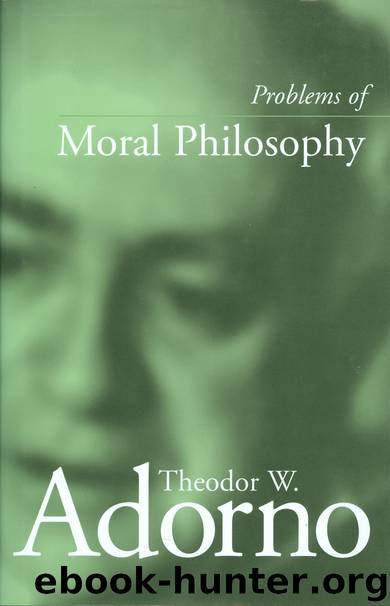Problems of Moral Philosophy by Adorno Theodor W.;

Author:Adorno, Theodor W.;
Language: eng
Format: epub
ISBN: 9780745619415
Publisher: Wiley
Published: 2014-09-01T16:18:33+00:00
NOTES
1 The reason for the cancellation of the lecture on 25 June 1963 is not known.
2 Critique of Pure Reason, p. 633, A 802 / B 830.
3 Ibid., p. 634, A 802 / B 830.
4 Ibid., p. 634, A 803 / B 831.
5 By Kant's first interpretation Adorno means ‘the intention of nature to coincide with freedom’. See pp. 91 and 93.
6 Cf. Walter Benjamin: ‘For even in its most paradoxical periphrasis, as intellectus archetypus, vision [Schau] does not enter into the form of existence which is peculiar to truth, which is devoid of all intention, and certainly does not appear as intention. Truth does not enter into relationships, particularly intentional ones. The object of knowledge, determined as it is by the intention inherent in the concept, is not the truth. Truth is an intentionless state of being, made up of ideas. The proper approach to it is not therefore one of intention and knowledge, but rather a total immersion and absorption in it. Truth is the death of intention’ (The Origin of German Tragic Drama, trans. John Osborne, NLB, London, 1977, pp. 35–6).
7 Kant talks of the ‘world concept’ (conceptus cosmicus) as the intention of philosophy, to describe ‘the relation of all knowledge to the essential ends of human reason’ (Critique of Pure Reason, p. 657, A 838–9 / B 866–7). In his ‘Reply to the Question: What is Enlightenment?’ he defines the ‘public use’ of the scholar's reason in these terms. [See Political Writings, p. 57. Trans.]
8 See ‘Religion within the Boundaries of Mere Reason’: ‘Now if a propensity to this [inversion] does lie in human nature, then there is in the human being a natural propensity to evil; and this propensity itself is morally evil, since it must ultimately be sought in a free power of choice, and hence is imputable. This evil is radical, since it corrupts the ground of all maxims […]’ (Religion and Rational Theology, p. 83).
9 Critique of Pure Reason, p. 152, B 131. Max Horkheimer draws attention to this quotation: ‘Self-preservation is the constitutive principle of science, the soul of the table of categories, even when it is deduced idealistically, as with Kant. Even the ego, the synthetic unity of apperception, the authority that Kant calls the supreme point to which the logical form of all knowledge must be attached, is in fact both the product of material existence and its precondition’ (Dialectic of Enlightenment, pp. 86–7 [translation altered]. Cf. the references to Spinoza and Hobbes in the same passage.)
10 Kant explains, ‘On the other hand, to preserve one's life is a duty, and besides this everyone has also an immediate inclination to do so. But on account of this the often anxious precautions taken by the greater part of mankind for this purpose have no inner worth, and the maxim of their action is without moral content’ (Groundwork, p. 63).
11 See Lecture 1, pp. 8–9.
12 [This is the conclusion of the story of the Good Samaritan in Luke 10: 37. Trans.]
13 [This is the usual translation of the phrase ‘Die Furie des Verschwindens’.
Download
This site does not store any files on its server. We only index and link to content provided by other sites. Please contact the content providers to delete copyright contents if any and email us, we'll remove relevant links or contents immediately.
Aircraft Design of WWII: A Sketchbook by Lockheed Aircraft Corporation(32286)
The Great Music City by Andrea Baker(31916)
Call Me by Your Name by André Aciman(20498)
The Secret History by Donna Tartt(19052)
The Art of Boudoir Photography: How to Create Stunning Photographs of Women by Christa Meola(18613)
Shoot Sexy by Ryan Armbrust(17720)
Plagued by Fire by Paul Hendrickson(17405)
Portrait Mastery in Black & White: Learn the Signature Style of a Legendary Photographer by Tim Kelly(16996)
Adobe Camera Raw For Digital Photographers Only by Rob Sheppard(16969)
Photographically Speaking: A Deeper Look at Creating Stronger Images (Eva Spring's Library) by David duChemin(16683)
Ready Player One by Cline Ernest(14643)
Pimp by Iceberg Slim(14488)
Bombshells: Glamour Girls of a Lifetime by Sullivan Steve(14056)
The Goal (Off-Campus #4) by Elle Kennedy(13657)
Art Nude Photography Explained: How to Photograph and Understand Great Art Nude Images by Simon Walden(13031)
Kathy Andrews Collection by Kathy Andrews(11812)
The Priory of the Orange Tree by Samantha Shannon(9064)
The remains of the day by Kazuo Ishiguro(8974)
Thirteen Reasons Why by Jay Asher(8893)
